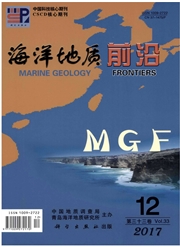

 中文摘要:
中文摘要:
为了研究灵山岛的沉积物软变形构造特征,利用野外露头考察、沉积岩石学、地球化学等方法,根据形态学、驱动力、沉积物液化及变形机制等因素进行了深入分析。识别出多种类型沉积物软变形:卷曲变形、液化底辟、负载构造、挤入构造、液化角砾岩、球—枕构造、泄水构造,并详细描述了这些沉积物软变形的表面特征和分布规律。依据各种地质记录,本区构造活动频繁、附近的五莲—烟台断裂于早白垩世是最活跃的时期,认为本文所描述的沉积物软变形是由地震触发引起的。根据不对称负载构造受横向剪切力分析,验证了吕洪波[1]推断早白垩世盆地古斜坡方向SE高NW低的观点。早白垩世巨厚白色凝灰岩可能系本区存在深切至下部岩浆囊的大断层所致,在这个深切过程中诱发一系列地震活动与沉积物的软变形。
 英文摘要:
英文摘要:
Many types of soft-sediment deformation structures, such as curled bedding, liquefied diapit, load structure, diapired structure, liquefied breccia, ball-pillow structure, water escape structure, micro-faults and large slump body, are found in the Cretaceous sediments at the Lingshan Island. Based on field observation and laboratory analysis, we described the characteristics and distribution pattern of the soft-sediment deformation structures, and discussed the paleo-morphology, driving forces and the deformation mechanism. The study area was suffered from frequent tectonic activities in early Cretaceous influenced by the nearby Wulian-Yantai fault. The deformation structures are most probably caused by earthquakes. The horizontal shear stress analysis for asymmetric load structures and micro-faults are used to determine the existence of paleo-slope and its direction. Our results verified the dominant paleo-slope dipping from SE to NW inferred by Lv Hongbo. Earthquakes in- duced volcanic eruptions and formed the thick white tuffaceous deposits. The deep fault, which may have extended to the magmatic pocket, provided channels for volcanic eruption.
 同期刊论文项目
同期刊论文项目
 同项目期刊论文
同项目期刊论文
 期刊信息
期刊信息
